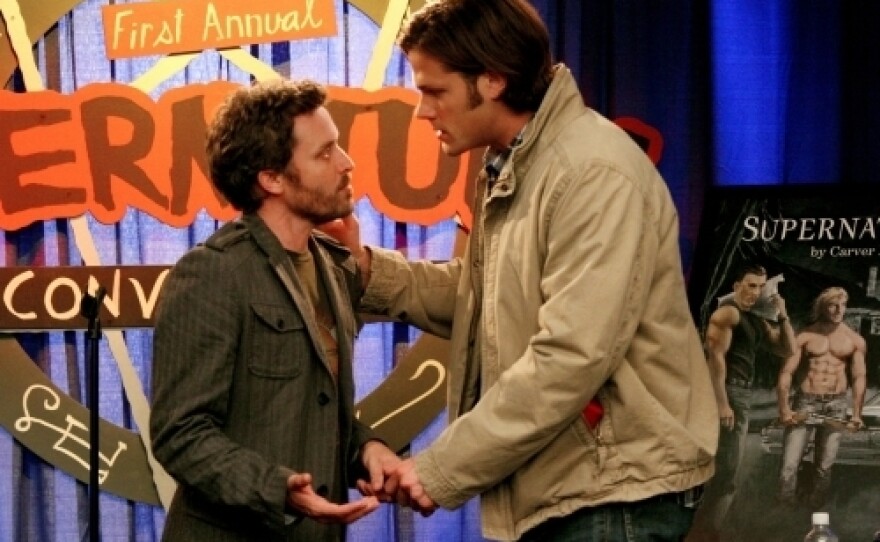How do you measure love?
OK, it's a huge question. And maybe not one generally applied to television. But the metrics of success determine whether a television show lives or dies. (If this is the sort of topic that seems frivolous, consider the billions of dollars TV and other copyright industries contribute to the U.S. economy. The stakes start feeling higher.)
And this is why we're looking at the CW show Supernatural. Unlike a massively popular scripted TV show like The Big Bang Theory or The Walking Dead, it has only about 3 million viewers. Its Nielsen ratings are, frankly, not that great. Yet Supernatural has lasted for nine seasons (so far), partly because its fan base makes up in engagement what it lacks in size. Supernatural has almost as many "likes" on Facebook as NCIS, a show with an audience six times larger.
That Supernatural's leads are two preternaturally handsome young men, of course, doesn't hurt. They're blogged about on Tumblr more than almost any other actor except for Benedict Cumberbatch. But it takes more than sex appeal to achieve such fan activation. Fans appreciate the show's complicated plotting, its rich world of details and its unanswered questions. That's all fodder to argue about on message boards and explore in fan fiction. What kind of powers does a fallen angel have? What were the main characters like as children? Is a sexy demon a good sexy demon or a bad sexy demon?
Supernatural is the second most popular TV show on fan fiction's biggest website. And Supernatural fan fiction has been penned by no less of a literary personage than S.E. Hinton, who's much better known for authoring classic young adult novels, including The Outsiders and That Was Then, This Is Now. She enjoys fan fiction's anonymity, so she refused to offer any clues about how to find hers.
"If you come across one that's just really good, that's mine," she told NPR.
Now, it's not unusual for fans to write fiction about their favorite TV shows. It's very unusual for TV shows to write scripts about their fans. Supernatural's writers intentionally incorporate the show's fandom back into the program's plot. So in the show, there's a series of books, called Supernatural, based on the adventures of the main characters. The Supernatural books have fans ... on the show, Supernatural. Those fictional fans hold Supernatural fan conventions, where they dress up as the main characters on the show ... while interacting with the characters on the show. Obviously, it gets staggeringly meta.

"Supernatural takes it to a whole other level," says Lynn S. Zubernis, a psychologist, professor and co-author of Fangasm, a book about Supernatural fans. "The sort of reflexive dialogue it has going on with its fandom."
Zubernis says Supernatural even dares to gesture toward slash fiction — the sort of fan fiction, usually written by women, that imagines a homoerotic relationship between a show's male characters. (On Supernatural, that's especially loaded. The characters are brothers whose last name is Winchester, so this kind of slash is called "Wincest" by fans. And it's probably why Supernatural's publicists did not return any of my emails seeking comments by the show's writers about fan engagement.)
This kind of dialogue between show and fan might seem novel, says English professor Katherine Larsen, the other author of Fangasm. But look back through literature, she suggests. Great stories have always inspired a powerful sense of ownership from enthusiastic fans.
"Charles Dickens changes the end of Great Expectations because the fans were not happy," she offers as example. And Sir Arthur Conan Doyle had to resurrect Sherlock Holmes in the face of fan outrage after their beloved detective died.
"So fans have had this kind of power for longer than we've had a really good sense of them having that power," she says.
East-coasters, how was #supernatural? Is it just me or is the guy in the trench coat a little off? Alluring, but poorly socialized.
— Misha Collins (@mishacollins) January 15, 2014
But how can that power serve a TV show — economically — today? Mike Proulx is a marketing communications executive and the co-author of a book called Social Media: How Marketers Can Reach and Engage Audiences by Connecting Television to the Web. He sees Supernatural as an intriguing test case.
"Nielsen has done a lot of research as to whether social media is helping people to tune in to TV," he says, noting that a show's traction on Twitter and Tumblr is starting to affect how networks pitch shows to the all-important advertisers. "They're no longer just including Nielsen ratings. They're also including social TV data."
Fan engagement gives color and volume to dry data, such as ratings, but the question remains, how do you quantify depth of feeling? Writing a story takes longer and means more than hitting a "like" button or re-blogging a picture. How do you measure a kind of success that, by its very nature, is completely resistant to metrics?
Copyright 2022 NPR. To see more, visit https://www.npr.org. 9(MDAzMjM2NDYzMDEyMzc1Njk5NjAxNzY3OQ001))







